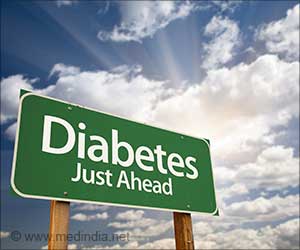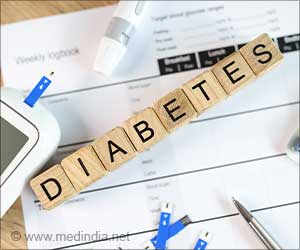People with low thyroid function have 13% risk of developing Type 2 diabetes and 40% the risk for pre-diabetics.

‘People with hypothyroidism gain weight and show reduced sensitivity to the hormone insulin, posing a risk for type 2 diabetes.’





In the new study, the risk of developing Type 2 diabetes over long-term follow-up increased by 13 percent for people with low thyroid function--often called underactive thyroid gland or hypothyroidism--or even those with low-normal thyroid function. However, the diabetes risk was up to 40 percent higher for individuals with reduced thyroid function if they already had prediabetes, the investigators reported. "These findings suggest we should consider screening people with prediabetes for low thyroid function," said lead investigator Layal Chaker, MD, of Erasmus Medical Center, Rotterdam, the Netherlands.
Currently, experts recommend thyroid screening of people with Type 1 diabetes, because they have a greatly increased risk of thyroid disease. Both Type 2 diabetes and hypothyroidism occur more often in older adults. However, Chaker said the association of thyroid function with Type 2 diabetes and prediabetes remains unclear.
Thyroid hormones are crucial for the regulation of metabolism, which is how the body converts food into energy or stores it. Hypothyroidism slows metabolism and can lead to weight gain. According to Chaker, past research has found a link between hypothyroidism and reduced sensitivity to the hormone insulin, another risk factor for Type 2 diabetes.
The study by Chaker and her colleagues included 8,452 participants from the Rotterdam Study, a population-based study in adults age 45 or older that reflects the general population in the Netherlands. Participants had an average age of 65 years. All participants had blood tests to measure their blood sugar and thyroid function. They were reexamined every two or three years to check for the development of Type 2 diabetes, and their medical records also were reviewed.
Advertisement
The researchers found that even among participants whose thyroid function was in the normal range at first measurement, progression from prediabetes to diabetes was reportedly 1.4 times higher for those in the lowest third of thyroid function levels compared with the highest third.
Source-Eurekalert















